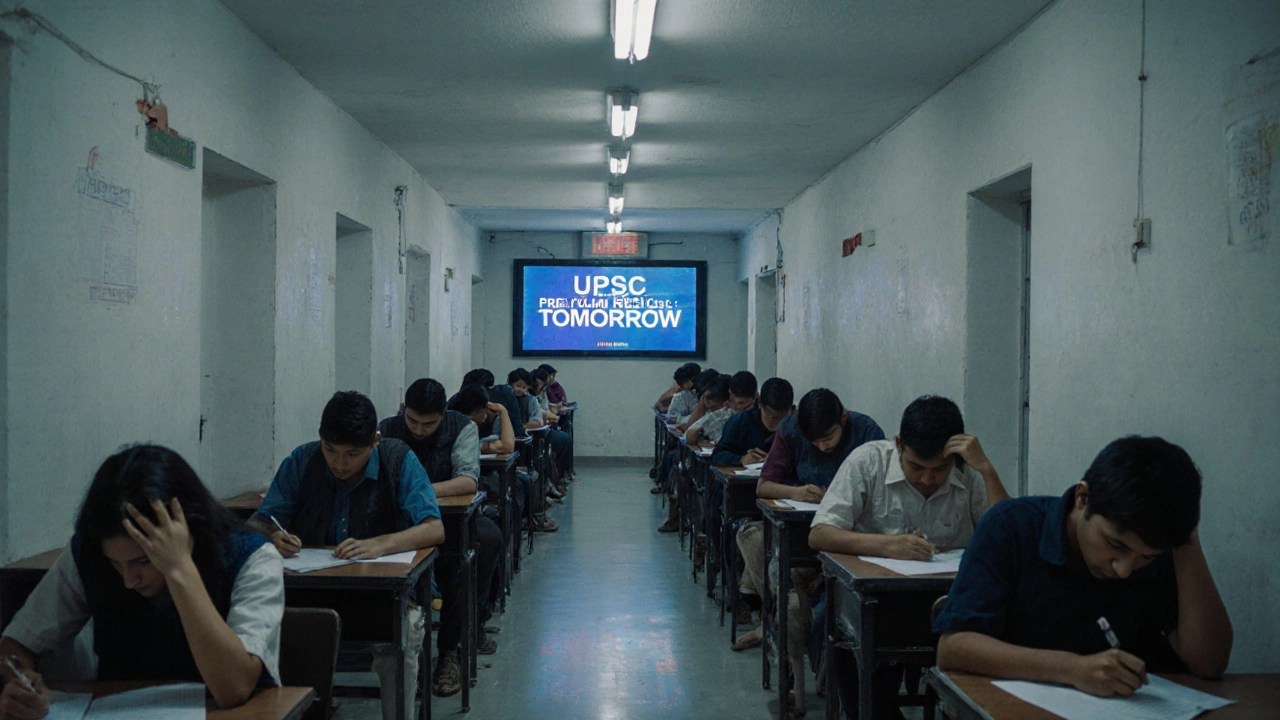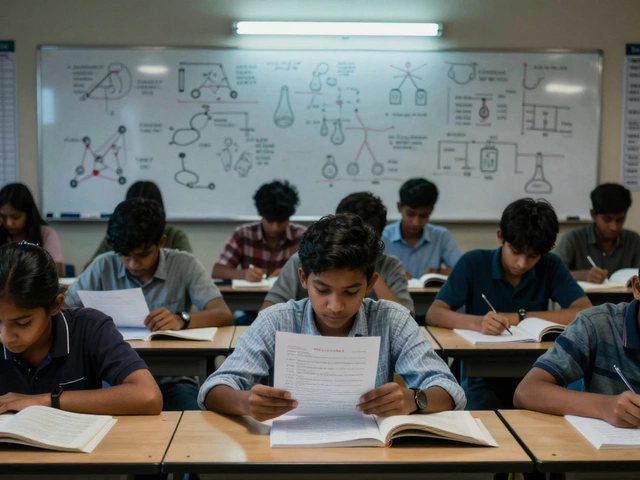UPSC Success Probability Calculator
Calculate Your Odds
How It Works
Based on data showing:
• 0.2% pass rate (1 in 500)
• Average 3-5 attempts
• 70% success rate after 5 attempts
• Psychological stress peaks at 5+ attempts
Your Probability
Estimated chance of clearing UPSC Civil Services Exam
Imagine studying 12 hours a day for two years, skipping birthdays, holidays, and even family dinners-all for one exam that can change your life forever. That’s the reality for millions of students facing what many call the most stressful exam in the world: India’s UPSC Civil Services Examination.
Why the UPSC Civil Services Exam Stands Out
The UPSC exam isn’t just hard-it’s a marathon disguised as a test. It’s not about memorizing formulas or solving equations. It’s about knowing everything: history, economics, international relations, agriculture policy, environmental science, constitutional law, and current events from the last 18 months. And you have to write essays on them in clear, structured Hindi or English.The pass rate? Around 0.2%. Out of 1.1 million applicants in 2024, only 2,200 cleared the final round. That’s less than 1 in 500. Compare that to Harvard’s acceptance rate of about 4%, and you start to see the scale of pressure.
What makes it worse isn’t just the content-it’s the structure. Three stages: Prelims (a multiple-choice paper you must pass to move on), Mains (nine written papers over five days), and the Personality Test (a 30-minute interview with a panel of senior bureaucrats). Fail any stage, and you start over. Many candidates take 5, 7, even 10 attempts before succeeding.
The Human Cost Behind the Numbers
There’s a quiet epidemic of mental health crises tied to this exam. In 2023, over 30 student suicides were reported in India directly linked to UPSC failure. In cities like Kota and Delhi, coaching centers have counselors on standby-not just for academic help, but to prevent breakdowns.One student from a small town in Bihar told a local newspaper: "My father sold our only cow so I could afford coaching. I couldn’t tell him I failed again. I slept in the bus station for three nights."
Parents invest life savings. Siblings drop out of college to help with household chores so the candidate can focus. Relationships end. Dreams are postponed. The exam doesn’t just test knowledge-it tests endurance, resilience, and emotional stability.
How It Compares to Other High-Stakes Exams
People often mention the IIT-JEE (India’s engineering entrance) or China’s Gaokao as contenders. But here’s the difference:- IIT-JEE: 1.5 million applicants, 10,000 seats. High pressure, yes-but it’s one exam, focused on math, physics, chemistry. You study for 1-2 years. If you fail, you can try again next year or switch paths.
- China’s Gaokao: 12 million students take it annually. One day, six subjects. Your score decides your university and career. But it’s standardized, predictable, and you don’t need to write essays on rural water policy or international trade treaties.
- UPSC: No fixed syllabus. No official textbooks. The exam changes every year. You’re expected to become an expert in everything. And the job you’re competing for? You don’t just become an engineer or doctor-you become a district collector, a police chief, or even a cabinet secretary.
Even medical entrance exams like NEET in India, which has over 2 million applicants, are narrower in scope. You need to know biology, chemistry, physics. That’s it. UPSC? You need to know how to manage a drought in Rajasthan, draft a policy for tribal land rights, and explain the impact of climate change on India’s GDP-all while staying calm under pressure.

What Makes It So Unforgiving?
The UPSC doesn’t just test what you know. It tests how you think. The interview panel asks questions like:- "How would you handle a mob protest over a water dispute between two states?"
- "What would you do if your superior ordered you to falsify a report?"
- "Why should we appoint you over someone who scored higher in the written exam?"
There’s no right answer. They’re looking for emotional intelligence, ethical grounding, and leadership potential. You can ace the written part and still fail if you come across as robotic, arrogant, or unprepared to serve the public.
And there’s no safety net. Unlike university admissions, where you can apply to multiple schools, UPSC gives you one shot per attempt. No backup plans. No second choices. If you don’t get selected, you’re back to square one-with no guarantee of another chance next year.
Why Do People Keep Trying?
Because the reward isn’t just a job. It’s status. Power. Security. A civil servant in India earns a pension for life, free housing, medical care, and social respect that few other careers offer. In rural India, becoming an IAS officer (Indian Administrative Service) is like becoming royalty.For many, it’s not about ambition-it’s about survival. In a country with 300 million people living below the poverty line, a government job means food on the table, education for siblings, and dignity for the whole family.
One 32-year-old candidate from Odisha, on his sixth attempt, told a reporter: "I’ve failed four times. I’ve cried in the bathroom after every result. But I still wake up at 5 a.m. because someone has to fix the system. And if not me, then who?"

Is There a Way Out?
Some students are starting to walk away. More are choosing alternatives: private sector jobs, startups, international careers, or even moving abroad. But for millions, UPSC remains the only path they believe offers real change.There’s no magic formula to pass. No shortcut. No app that can replace 10,000 hours of reading. The only thing that works? Consistency. Discipline. And the quiet, stubborn belief that your effort matters-even when the world doesn’t notice.
Maybe the most stressful exam isn’t the one with the most questions. It’s the one that asks you to carry the hopes of your entire family-and your country-on your shoulders, and still show up every day.
Is the UPSC the hardest exam in the world?
Yes, by most measures-pass rate, duration, scope, and psychological toll. With only 0.2% success and a multi-stage process that can take over a decade to complete, UPSC stands apart from other exams like IIT-JEE, Gaokao, or even the US Bar Exam. It’s not just about knowledge; it’s about endurance, ethics, and emotional resilience.
How many attempts do people usually need to clear UPSC?
On average, successful candidates take 3 to 5 attempts. Many take 7 or more. The maximum number of attempts allowed is 6 for general category candidates, 9 for OBC, and unlimited for SC/ST until age 37 or 42, depending on the category. Some candidates begin preparing in their late teens and clear it in their early 30s.
Can you prepare for UPSC without coaching?
Absolutely. Over 40% of top rankers in recent years didn’t join any coaching institute. They relied on free online resources, NCERT textbooks, newspapers like The Hindu, and disciplined self-study. Coaching helps with structure and mock tests, but it’s not mandatory. What matters most is consistency, access to reliable sources, and the ability to analyze and write clearly.
What’s the best way to manage stress during UPSC preparation?
Establish a routine that includes sleep, exercise, and breaks. Many toppers meditate for 15-20 minutes daily. Talking to someone-a friend, mentor, or counselor-is critical. Avoid comparing your progress to others. Focus on your own pace. Some candidates take one day off per week just to reset. Mental health isn’t a luxury-it’s a requirement to survive the process.
Are there alternatives to UPSC for high-status government jobs?
Yes. India has other competitive exams like SSC CGL, RBI Grade B, and State Public Service Commission exams. These are less stressful in scope and duration, though they still require serious preparation. Some candidates aim for these as backup options. Others pursue careers in the private sector, NGOs, or international organizations like the UN or World Bank, which offer meaningful impact without the same level of pressure.
What Happens After You Pass?
If you finally clear UPSC, the celebration is short. You’re posted to a district, often in a remote area with no internet, no reliable power, and a population of 2 million people who depend on you to fix roads, manage floods, or stop corruption. The job doesn’t end when the exam does-it begins.There’s no trophy. No diploma you can hang on the wall. Just a quiet responsibility that lasts your entire career. That’s why the UPSC isn’t just the most stressful exam in the world. It’s one of the most meaningful.


